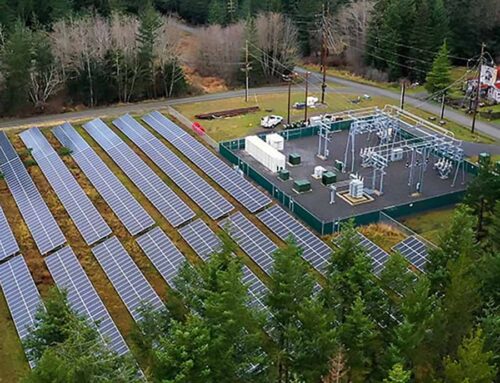Maine will benefit from staying the course on clean energy
May 14, 2025
Recent articles have pointed out something that those of us working in the trenches to advance a clean energy future have known for decades: reducing our unhealthy dependence on fossil fuels won’t be as easy as flipping a switch. And these days, with a federal administration irrationally hostile to making us more energy independent by investing in American-made renewable energy, it hasn’t gotten any easier.
Unfortunately, these stories miss the urgency of the challenge and ignore the opportunities the energy transition represents. Instead, they present the status quo — where relying on dirty oil and gas for 80% of our energy use drives high bills for Maine families and small businesses — as unavoidable.
It’s been said that to see what is in front of one’s nose needs a constant struggle. Our climate predicament is still stark. Carbon dioxide concentrations rose at a record rate in 2024. The Gulf of Maine is warming faster than 99% of the world’s oceans. Last year’s storms — both flooding inland and devastating damage to working waterfronts — are just the beginning. Without faster progress, climate impacts will cost Maine residents tens of billions of dollars in economic harm.
The dirty secret in energy policy is that there aren’t any easy options. Take one well-trodden suggestion, that we just build more gas pipelines. If that were true, then why did electricity supply prices — which are driven by the fuel costs for natural gas power plants — spike so high in 2022 and 2023, then come down? It wasn’t because a pipeline got built. It’s because natural gas prices, like all other fossil fuels, are driven by global markets that Maine has no control over.
But just because the path isn’t an easy one, doesn’t mean it doesn’t lead to a better place. Moving away from fossil fuels like oil and propane to heat pumps reduces heating burdens, especially alongside energy efficiency and air quality improvements. Electric vehicles cost the equivalent of $1.25 per gallon to fill up and cost less to maintain. This is why Maine’s new energy plan shows that by moving to 100% clean energy, and cutting expensive fuel use, average household energy costs would fall by an average of $1,300 a year.
We have good choices for homegrown renewable sources of energy too. Wind power in Aroostook County is still untapped. Offshore wind is by far Maine’s most abundant clean energy resource. Last year the Biden administration sold offshore lease parcels — all outside the footprint of the Maine lobster industry — that could generate enough power for 2.3 million homes across the region.
Offshore wind will also create thousands of jobs for Maine people, and can be the foundation of a more resilient regional electric grid. Plus, with careful siting and project development, the impacts of this new energy industry can be responsibly managed.
Smaller scale “distributed energy resources” could save billions in the coming decades, avoiding expensive grid upgrades by generating solar power closer to where it’s used, using new flexible battery storage to avoid firing up dirty power plants when demand is high, and leveraging automation to help customers save money when power prices are lower.
Renewable energy costs have plummeted in the past several years. And the rise of these fuel-free power sources is a global phenomenon, which no administration in Washington, D.C., can stop. Last century’s power sources aren’t just polluting, they’re a dead end.
Maine spends more than $4 billion per year on fossil fuels. That’s about $500,000 every hour of every day that we quite literally light on fire. You can’t tell me we can’t do more for Maine people with money like that.
Progress doesn’t happen in a straight line; far from it. Powerful voices invested in things staying the way they are will tell us it’s too hard. It’s not possible. We should give up. But we shouldn’t listen.
If we keep working toward an energy system that works for everyone, we can power Maine forward toward a future with cleaner air, better jobs, thriving businesses and, yes, lower energy costs.
Search
RECENT PRESS RELEASES
Related Post


